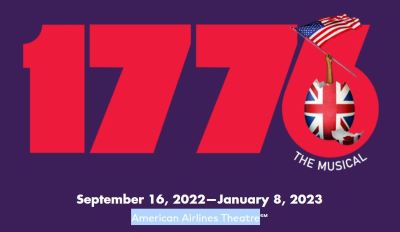YOU SAY YOU WANT A REVOLUTION?
Take a look at the new production photos of Roundabout’s current Broadway revival of 1776, featuring Kristolyn Lloyd, who joined the company October 25 as John Adams. While you’re doing that, I’ll give you my thoughts on 1776, one of my favorite musicals. You see, Jeffrey L. Page & Diane Paulus’s cast includes multiple representations of race, ethnicity, and gender; they identify as female, transgender and nonbinary. There’s a reason why this makes sense, and why the show is doing so well. (It only plays through January 8, so don’t delay.)
The company of Roundabout Theatre Company's 1776
How remarkable to have been a fly on the wall when the creators of 1776, the 1969 musical were deciding the 11 o’clock number (the trope given for the big, late in the second act number by a self-realizing main character that also energizes the audience). For, up to this point, 1776 is about John Adams’ tireless crusade to enroll the Continental Congress to vote for independence from England. You would think the song would be something like “The Spirit of ’76!” sung by John Adams. Instead, a South Carolina Congressman goes berserk (with African rhythms no less) during his tirade about the North’s economic complicity in the Slave Trade. Any producer in his right mind would have given up at the reading and taken the million dollar loss.
Kristolyn Lloyd (John Adams)
But that is only one of the miracles of this revolutionary musical. Peter Stone created some of the wittiest, most sophisticated dialogue in musical theater history, and, as conceptualized by composer and lyricist Sherman Edwards, one of the most compelling stories ever seen in the book of a musical. Stone wisely believed that Adams and the others were not to be treated as Gods in his script; instead, they should have an affectionate familiarity to the audience, nothing reverential.
The Company
1776 is wisely more folklore than truth: for example, Stone includes a collection of bon mots from Benjamin Franklin’s entire career which are conveniently inserted into the action ’” as are the many letters between John and Abigail Adams. The truth is that both the debates and signing of the Declaration were a slipshod affair (historians can only surmise the date of the signing, but it surely was not July 4) and too much fidelity to the truth ’” especially the timeline of events ’” would have made for poor storytelling (56 signatories have been whittled down to 19 here). Stone and Edwards were revered with a Tony Award for Best Musical, beating out Hair, the rock musical that surely was the zeitgeist of the times, but in hindsight not nearly as timeless as this soul-stirring and rousing affair.
The company
The “obnoxious and disliked” John Adams and Ben Franklin are having trouble getting a discussion on Independence off the ground, so they coerce Richard Henry Lee to propose a vote on independence from Britain. Later, when a proposal to suspend discussion on independence is narrowly defeated, it leads to a walking-stick fight between Adams and Philadelphia’s John Dickinson. A committee to write a declaration of independence is created and must deliver the document three weeks hence. Thomas Jefferson is selected by default in the delightful number, “But, Mr. Adams.”
(l to r): Allyson Kaye Daniel (Abigail Adams), Kristolyn Lloyd (John Adams)
Glorious moments in this show are multitudinous, but even though we all know how it turns out in the end, it’s a true nail-biter. Along the way, there’s Abigail Adams, whose only interaction with the cast is via the famous letters between her and Mr. Adams; Martha Jefferson, who was drawn to her husband because “He Plays the Violin”; and a battle-scarred courier singing the affecting war-weary ballad, “Momma, Look Sharp.”
(l to r): Elizabeth A. Davis (Thomas Jefferson), Patrena Murray (Benjamin Franklin) and Kristolyn Lloyd (John Adams)
And with a revolution is humming through America now — only this time it is self-revolution as all genders, sexes, races and what it means to identify as an American — this musical remains as timely as ever; the casting makes it timelier. It is so different from Roundabout’s astounding revival with Brent Spiner. and yet the zeitgeist of our time always informs this musical whenever you see it. (A little trivia: 1776 has the longest non-singing break in musical history: almost 45 minutes, I believe.
Kristolyn Lloyd (John Adams)
1776 is highly recommended, but especially to those parched individuals who need to be slaked from America’s current dearth of inspiration. If you are feeling downtrodden about our current political climate (and who isn’t?), bolt for the American Airlines Theatre and see why Vietnam-era audiences lapped up 1776: you will find that remarkably little has changed in politics. The difference back then was that the colonials put their lives on the dotted line, got something done, and changed history in the process.
photos by Joan Marcus, 2022

